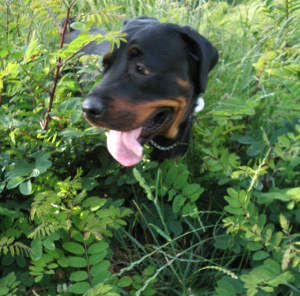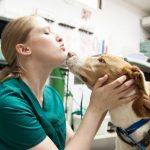Hi, welcome to my Rottweiler FAQ Page!
In This Article You Will Read About
As this website has grown and developed, I’ve found that many Rottie owners have similar questions, worries and concerns….. and that the answers are not readily available online, or elsewhere.
On this page you’ll find the answers to the questions that appear in my ‘Inbox’, and on my Rottweiler Questions page, on an almost daily basis.
I hope you find it useful and that it makes life a little easier for you 🙂
If you’re just browsing, feel free to scroll through all the Rottweiler FAQ on this page.
But if you’re looking for the answer to a specific question, you can use the Quick Links below to skip straight there!
Is My Rottweiler Puppy Purebred?
This is one of the Rottweiler FAQ that I see a LOT of, and there’s really no 100% for-certain answer to!
The most accurate way to know whether or not your new Rottweiler puppy, or dog, is purebred is to know (and have proof of) his/her parentage and bloodlines – ie. his pedigree.
A purebred puppy will come with authentic registration papers from a recognized and reputable breed registry such as the AKC (American Kennel Club), CKC (Canadian Kennel Club), KC (British Kennel Club), or other registry/club that is specifically devoted to that particular breed (ie the ADRK in Germany for Rottweilers).
These papers will confirm that the pups’ parents are purebred (as are the generations before them). Don’t ever purchase a puppy as ‘purebred’ if there are no papers.
The second reasonably reliable way of determining whether or not a dog is purebred is by DNA testing. It is a science that can produce very specific and accurate results, but depending on the breed/s of dog being tested there is room for error or skewed results.
However in some circumstances DNA tests can be extremely specific. For example, if you have a Rottweiler pup who has AKC papers for example, and you want to be certain that his sire is the dog named on his pedigree, you may be able to get absolute confirmation of that.
This is because the AKC requires a DNA profile to be on record for dogs that sire multiple litters, so if your AKC pup supposedly has a ‘big name’ sire and you have doubts – you can put your mind at rest (or not!).
Of course EVERY system has loopholes, and creative and unscrupulous breeders can – and do – exploit them, so there’s no 100% water-tight guarantee. But by taking your time and choosing a breeder carefully, you stand a much better chance of getting that purebred pup with the bloodlines you want.
Is My Rottweiler Growing Properly?
When it comes to Rottweiler FAQ, some of the questions I hear the most are about the growth, development and size of puppies or dogs.
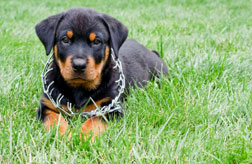
Many Rottie owners are almost obsessed by the ‘look’ and size of their dogs and a surprising number worry that their little guy (or even girl) isn’t ‘measuring up’!
First let me say that Rottweilers were not originally bred to be ‘X-Large or Giant’ dogs, and people who breed for this sort of huge size do not have the best interests of the individual dogs, or the breed as a whole, at heart.
To learn more about the ‘ideal’ Rottweiler, take a look at my Rottweiler Breed Standard page, particularly the paragraphs dedicated to ‘Size – Proportion – Substance’.
Bigger is not always better, and this is very true here. Trying to make a puppy grow bigger, or faster, than comes naturally can lead to all sorts of health issues – some very serious – and should never be attempted.
It’s also important to realize that Rottweilers are very slow to mature and reach their full adult size. Also that they reach their full height before their full weight, and so may seem a bit ‘out-of-proportion’ for a time.
Generally a Rottie will be fully grown by around 2 years of age, but some of the bigger males can take even longer to really ‘bulk up’ and gain all their weight and muscle development.
Although there really is no such thing as an ‘average Rottweiler’ because every single dog is an individual, there are some general guidelines for growth and weight gain in Rottie pups and you can find a lot of information on this on my Rottweiler Puppy Growth Chart page.
Finally, do remember that there’s so much more to a Rottweiler than size….. these are amazingly intelligent, courageous, loving and loyal dogs, who should be appreciated for not just their stunning looks, but for their awesome personalities and companionship.
Is My Rottweiler Growling At Me?
It’s not unusual for new Rottweiler owners mistake this breeds’ tendency to ‘talk or grumble’ with actual growling – and it’s not the same at all!
If your dog seems to make rumbling sounds deep in his throat when you are petting him, or when he’s relaxed and being loved on, chances are he’s simply expressing his contentment. It’s sort of like a cat purring, and isn’t an aggressive action.
Not all Rotties do this, but many of them do and the actual sound itself can vary from dog to dog. Some literally ‘purr’ in a low, rumbling way….. others grunt or groan…. it’s a very individual thing.
If it’s your first Rottweiler you may be confused by this, but if you watch his body language you should be able to tell the difference between this ‘talking’ and real growling as you get to know him better.
If he curls his lip/s, stiffens his body, puts his ears back or his ‘hackles’ rise, then he’s NOT ‘purring’ and you need to use caution and seek some professional input as to why he’s behaving this way.
Rottweilers are NOT dangerous dogs, or indiscriminately aggressive – and a well bred, properly raised Rottweiler should never be combative with their owners, or anyone else they come across in a non-threatening situation!
If you do have a Rottie that growls or snaps at you or other members of your family, you absolutely need to get some professional help in training and reshaping his/her behavior.
Talk to a licensed dog trainer or dog behavioral specialist asap.
Are Rottweilers Okay With Other Dogs & Cats
Another of the Rottweiler FAQ I often see, deals with worries about how a new puppy or dog will get along with other pets.
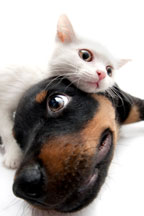
Because Rottweilers are big, strong dogs many owners worry that they won’t get along with other dogs, a new puppy, or cats, or that they may hurt them intentionally. That is rarely the case.
If your Rottie pup is raised with other dogs (even tiny ones) or cats, he will accept them fully and learn what lines can – and cannot – be crossed.
In most situations the animals work things out for themselves and it’s best for the human family members to stay out of it unless there is a real danger of one of them getting seriously hurt.
Older dogs are generally very tolerant of puppies, and puppies soon learn to respect their elders.
If you have a large breed pup and he is raised with smaller dogs, his canine instincts will ensure that he recognizes them as his superiors, even if they could fit in his mouth!
Cats are generally much better at taking care of themselves than dogs, regardless of the size difference, and in many homes (mine included) the cats always come out on top.
Of course, it’s never okay to allow a bigger pup or dog to harass or hurt a smaller pet, and a verbal correction and sometimes a ‘time out’ may be needed now and then (especially with an energetic or ‘hyper’ pup), but usually the situation works out just fine.
Introducing an adolescent or adult dog who is not familiar with small dogs/cats etc. into a multi-pet home can be much more challenging. But, providing all the animals involved are temperamentally sound, with proper supervision and patience, most situations resolve themselves fairly rapidly.
One other point to make here is that Rottweiler puppies are big and grow rapidly, this means they’re often a bit clumsy, awkward and unaware of their own size/strength.
Unintentional injuries or accidents can happen and it’s always a good idea to supervise multi-pet play sessions until you’re sure they’ve all adjusted to each other and recognize their limitations.
Help… My Rottweiler Is Too Friendly!
For me, this is one of the saddest complaints that I get…. and I see them all too often.
This breed has a totally undeserved reputation for being aggressive, and too many people purchase them for the completely wrong reasons. Which is what leads to these type of questions in the first place!
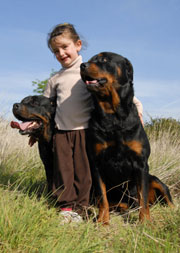
Yes, the Rottweiler dog is a guardian breed… and yes, they will protect their owners and possessions if the occasion arises, BUT they are not anti-social, ‘macho’ dogs designed to be menacing for no particular reason.
To learn more about the character and temperament of the REAL Rottweiler (as opposed to the one presented by the media and other ill-informed bodies), I’d recommend checking out my Rottweiler Temperament page.
A Rottie that is well-bred (ie from parents that are physically and mentally sound), and has been raised with love and the appropriate training and socialization, will grow up to be a calm and confident dog.
He isn’t a Labrador Retriever, and don’t necessarily expect him to love everyone he meets or tie himself in knots for attention, but you definitely shouldn’t expect him to be fearful or aggressive when around other people or dogs.
One of the things that makes the Rottweiler dog such a great guardian is his intelligence and reserve. They’re a very discerning and intuitive breed and can tell the difference between a situation that is threatening to them or their loved ones, and one that isn’t, and they will react appropriately for each situation.
NEVER encourage your pup or dog to be aggressive or combative (with the exception of professional Shutzhund or other similar training), as this will confuse him and make him uncertain and possibly act unpredictably. That is not what you want.
Don’t think that just because your dog is friendly and accepting of family, friends and strangers in most situations that he won’t recognize a threat or protect you should it be necessary.
I totally trust my dogs’ instincts and have had occasion to see their intuition in action….. it’s part of their breed characteristics, but needs to be allowed to develop naturally as they grow in self-confidence and maturity.
Again, remember that a Rottweiler pup matures slowly and you shouldn’t expect to see his guarding instincts begin to develop until he’s adolescent… and even then he’ll often feel a bit confused or conflicted and not act consistently.
Your Rottie is first and foremost a loving (and loved) member of your family and he will give you his heart 100%, and would lay down his life to protect you if necessary – no matter how much of a teddy bear he is……
I just hope that he never has to.
If you haven’t found the answer or information you need on this page, or are interested in information on a specific topic, please use the searchbox below to find all the relevant articles/pages on my website.
Just type whatever word/phrase best describes your needs (ie. rottweiler personality or puppy biting) and hit ‘search’, you’ll instantly get access to all the info and advice you need…….

